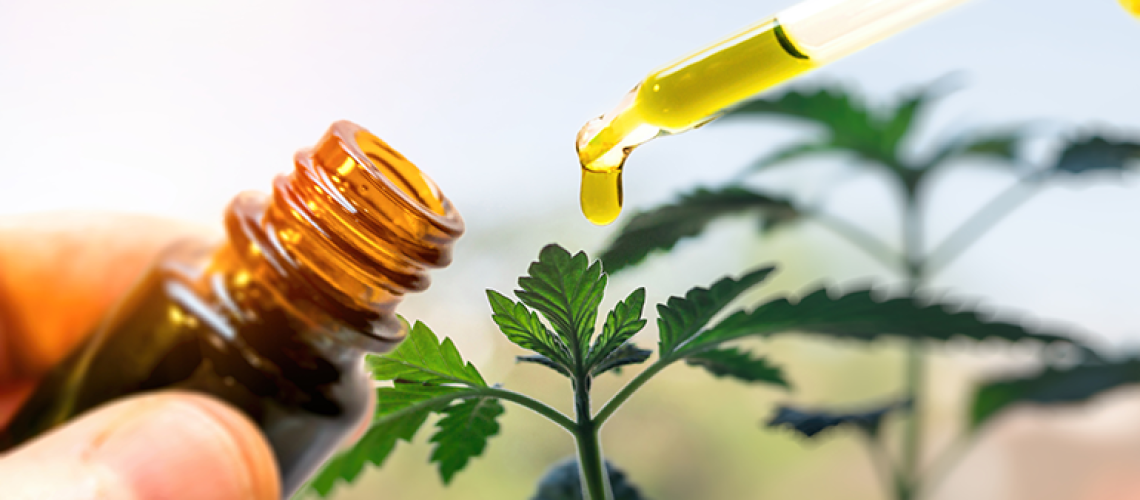CBD is one of the more than 100 Cannabinoids found in the Cannabis plant which is also used to produce hemp and marijuana. It’s extracted from the resin of cannabis through different processes, similar to it’s cousin THC, and then mixed with different oils like coconut oil among others.
The major difference between CBD and THC is that CBD is non-psychoactive which means patients don’t get high off of it and there’s no potential for abuse. They also have different medicinal properties.
How does CBD affect the body?
CBD works by acting on the body’s endocannabinoid system. This system’s main job is to maintain homeostasis (balance) and help the body adapt to stress. There are two main types of cannabinoids—the ones produced in the body called endocannabinoids and the ones produced by plants called phytocannabinoids. CBD is one type of phytocannabinoid. Phytocannabinoids mimic endocannabinoids, so they can act like a supplement, and boost you beyond what your body can produce. Receptors for cannabinoids are mostly found in the nervous, digestive, reproductive, and immune systems. Since Cannabinoids interact with almost every system in our bodies, some consider it a cure all and even though it cannot heal it all, it can definitely regulate neurotransmitter function, inflammation, mitochondrial function, and metabolism.Who should try CBD oil?
According to recent studies from the World Health Organization, CBD is for almost everyone, since its benefits range from prevention to actually treating and healing some conditions. Patients are taking it to prevent Alzheimer’s, help with their anxiety and chronic pain via it’s anti-inflammatory properties. Here is a list of its benefits:Improves mood disorders.
CBD works directly on the brain receptors for Serotonin and GABA (an inhibitory neurotransmitter). Lower levels of these have been linked to anxiety and depression.Lowers inflammation.
Suppresses cytokine production and induces T-regulatory cells to protect the body from attacking itself, which can help inflammatory and autoimmune conditions.Decreases chronic pain.
Inhibits transmission of neuronal signaling through pain pathways.Aids gut health.
Helps heal the leaky tight junctions that contribute to intestinal permeability and decreases spasmodic activity common in IBS.Helps treat seizures.
May relieve some types of Epilepsy especially in kids.Side effects of CBD.
CBD has very few side effects and is considered a safe substance to take. These are some of them.- Nausea
- Dry mouth
- Vomiting
- Diarrhea
- Bloating
How to choose a CBD product.
Patients might choose from vape pens, edibles, topical balms and patches, capsules, tinctures and oils but keep in mind that CBD production and distribution are not regulated by the FDA. That means it’s important to do your homework in order to know exactly what you’re getting. Recent studies all over the state are showing that most CBD sold out there have much less CBD content than advertised, have more THC than they should and even had pesticides in it. The best way to find out the quality of your CBD is to discuss directly with the company you are purchasing from. Look for companies that do extensive third party testing to ensure the highest standard or get from a state approved dispensary. Click here for a list of approved ones in Florida.Final thoughts on CBD.
While there are many studies showing signs of CBD’s health benefits, research is limited on its long-term effects. If you try a CBD oil and start to see unpleasant side effects, stop taking it and see your doctor. At the end of the day, CBD oil is a supplement and should be used as part of an overall healthy lifestyle. You can reap incredible anti-inflammatory benefits from eating a whole foods based diet, addressing nutritional deficiencies, exercising, and introducing stress reduction practices like meditation in your regular routine.Related
-
Understanding our Endocannabinoid System
The endocannabinoid system plays many important roles in the human…
-
Ways to Smoke Marijuana in Florida
Have access to the smokable Marijuana type, by signing a…
-
Different Ways of Using Medical Marijuana in Florida
Medical Cannabis can be used in many different forms and…




